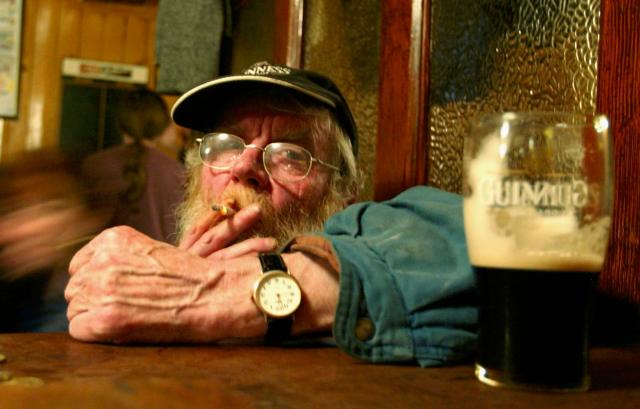British pubs are closing down at a rate of 18 every week. Credit: Fran Veale / Getty

According to John Harris in the Guardian, British pubs are closing down at a rate of 18 every week. That’s not all bad news, because some of them are truly grim – nevertheless, as a general rate of attrition, it’s alarming.
Then again, for every pub that closes down, a coffee shop seems to open. In the town where I live, we now have a ‘cat cafe’. This is a cafe with cats rather than for them – and yet it’s somehow symbolic of the direction our society is going in:
“If our era has a pre-eminent gathering space, in both its chain and independent forms, it is surely the modern cafe – where most people seem to be hunched over their laptops, transfixed by their phones, or huddled with friends and oblivious to everyone else. This is the opposite of the places where the best kind of chaotic, unexpected experiences can happen and you might end up falling into conversations with complete strangers.”
Harris fears that genuinely shared spaces are disappearing from our communities – as well as pubs, he mentions the demise of village shops, night clubs, music venues, public libraries and youth clubs.
Some of this he blames on “the effects of ten years of austerity” – but that’s not the only cause:
“On one hand cuts; on the other, deep cultural changes that are pushing us even further apart. Among some middle-class people there has long been a cringe about anything that smacks of cultural universalism, but this prejudice now seems to be defining an ever-greater swath of our culture… From Wetherspoons to McDonald’s, places that emphasise affordability and an appeal that runs across income groups and generations are viewed more snobbishly than ever. “
A few weeks back, I wrote about the ‘open versus closed‘ narrative in politics – and the way in which those who are loudest in their support for liberal policies on issues like trade and immigration just happen to be those most insulated from the downside.
The cultural equivalent is to embrace an identity that is either so broad that it makes few demands on insiders (I’m a passionate European, don’t you know’), or else so narrowly defined as to exclude anyone who isn’t like you. In an era when identities are increasingly politicised, its purpose might even be to make demands on outsiders – but more likely it’s just a means of associating with people of much the same age group, social background, tastes and opinions.
To be carefully avoided, however, are identities firm enough to require at least some sacrifice on the part of the individual – and wide enough to embrace and link together different kinds of people, not just those who naturally flock together.
These are perhaps better described as loyalties than identities – and they can be both costly and uncomfortable. But then that’s the thing about sharing.
All of that said, in almost every village, town and city in the land, there is one place, and perhaps several, where you can be part of a genuine community – and furthermore one composed of people from different generations, classes and backgrounds. Whether or not you consider this to be good news rather depends on your attitude to the Good News.










Join the discussion
Join like minded readers that support our journalism by becoming a paid subscriber
To join the discussion in the comments, become a paid subscriber.
Join like minded readers that support our journalism, read unlimited articles and enjoy other subscriber-only benefits.
Subscribe